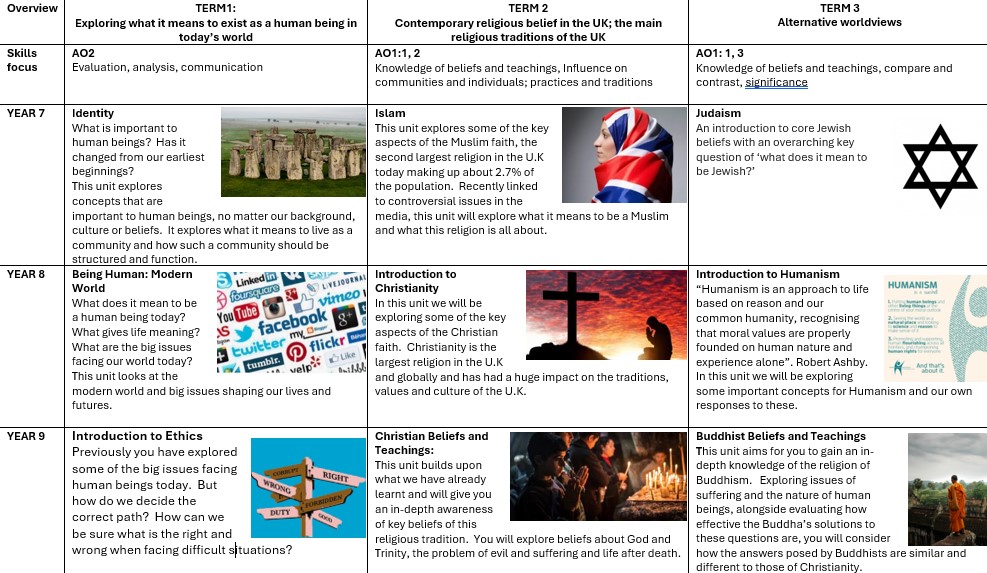Intent
- To allow students to consider the 'big questions', ethical, philosophical and spiritual, for themselves and so develop their own sense of purpose, meaning and place in the world. To allow them space to respond as unique individuals to the plurality within the classroom and society in relation to these questions.
- To develop an awareness of difference and diversity and of the form our society takes and so leave as effective participants in a plural democracy.
- To leave Park with a qualification in RE demonstrating secure knowledge and understanding of the issues and traditions studied.
"…entails teachers bringing children and young people first to attend to their own experience and that of others, to engage intellectually with material that is new and to discern with others what is valuable with regard to living a religious life or one informed by a non-religious or other perspective..."
Living Difference IV, The Agreed Syllabus for Hampshire, Portsmouth, Southampton and the Isle of Wight 2021At Park Community School, we aim to help students to develop a curiosity regarding the world around them, to attend to issues important in exploring what it means to exist as a human being in the world today. RE offers students the opportunity to explore questions of meaning for them as individuals, and to develop a greater sense of personal identity and purpose, a greater sense of their place in the world and what that world should be like.
Park Community School encourages students to value themselves and others, respecting different religions, cultures, and values. RE is not about promotion of a particular view but about challenging assumptions and exploration of life's questions in relation to, and in collaboration with, others.
"Religious education in Hampshire, Portsmouth, Southampton and the Isle of Wight intends to play an educative part in the lives of children and young people as they come to speak, think and act in the world."
Living Difference IV, The Agreed Syllabus for Hampshire, Portsmouth, Southampton and the Isle of Wight 2021Students are encouraged to reflect on a range of individual, school, local, national and world issues in order to develop a vision for their future and the future of others. It is our hope that our students recognise the importance of their own creativity in improving the quality of life not only for themselves but also for future generations.
Additionally, RE allows the development of rigorous, critical and analytical thinking and argumentation in the evaluation of particular concepts and ways of experiencing the world. Therefore, we aim to foster students' ability to reason, to avoid making assumptions or taking information at face value.
The school provides Religious Education for all students in accordance with the agreed Hampshire syllabus called 'Living Difference IV'. This gives students the opportunity to explore a range of religious traditions, cultures and worldviews alongside developing their own in response to these. While a variety of perspectives will be investigated including secular traditions such as Humanism, the curriculum is mainly Christian based. This is to reflect the national and local character of religious belief, and to acknowledge the role that this religious tradition has had in underpinning the development of British values, laws and attitudes.
The way in which such traditions are explored acknowledges that what it means to be religious can be answered in a number of qualitatively different ways. These include subscription to a set of propositional beliefs, to follow certain practices and traditions, and to have a particular way of existing or being in the world. It recognises that being religious, or non-religious, is not one thing, and that questions of faith and belief are complex.
Additional Aims:
- Developing a broader cultural capital
- The promotion of SMSC
- The promotion of British values in line with government requirements
- Developing resilience to radicalisation and extremism in accordance with the 'Prevent Duty'
Implementation
KS3 aims to offer an introduction to a selection of faith traditions, both religious and non-religious. It also aims to enable students to begin to develop their sense of personal identity and their sense of meaning and purpose in the world. Units of work follow the 'Cycle of Enquiry' process as set out in Living Difference IV.
KS4 follows the AQA (A) specification, and all students are entered for the exam. The religions studied are Buddhism and Christianity. The teaching of the GCSE aims to give an in-depth awareness of the beliefs and practices of these two faith traditions alongside an analytical and evaluative exploration of four themes chosen for their importance to students' lives and general awareness of the societies and communities we are a part of.
The Cycle of Enquiry: The KS3 curriculum follows a three-year course taught using the 'Cycle of Enquiry'. Learning is driven by conceptual analysis and so each worldview explored will be taught around a selection of important concepts within this tradition. KS4 follows this pedagogy where appropriate in line with the content required for examination.
Content
